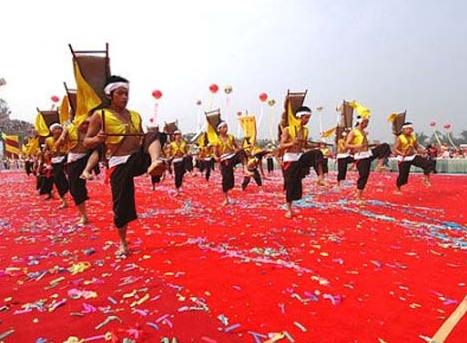
Bashan Bei'erge (Song of Bashan Back-carriers) is a folk song form born and popular in area under the jurisdiction of Bazhong City, which is at the southern foot of Mount Micang in northeastern Sichuan Province. In the past, the area was inaccessible, so all goods in and out of the mountain were carried by men. These men were called "Beilaoer" or "Bei'erge" (back-carriers), so the song they sang while taking a break during the journey got the name "Bashan Bei'erge". It is usually sung with a leading singer or in unison.
Bashan Bei'erge may have a history of 3000 years in the Daba Mountain area. The ancient roads Micang and Hanbi that stretch from Hanzhong to Tongjiang and Liangzhou to Bazhou are the only road for back-carriers. Since Micang ancient road has existed for 3000 years, the history of Bei'erge should be at least 3000 years. According to accurate historical records, the Buddhist scriptures that Xuanzang obtained when going on pilgrimage to the West were carried back by back-carriers with square-shoulder splints.
The lyrics of Bei'erge are mainly arranged in seven-word metrical style with a strict tonal pattern and rhyme scheme, and expressed through Fu (description), Bi (metaphors and similes), Xing (describe something through other things at first); The nonsense syllables are mostly substantive, and the mode follows the tunes of Zhi. The song has a single-section form with two phrases, and there is no introduction, connection, transition, and finale. Bei'erge is a form of high-pitched folk song. It has resounding and sweet melodies and a wild and bold style, and ends with throat singing, which is full of local style. The language in Bei'erge is humorous and improvised. Puns are employed a lot to voice people's inner world. There are many qu tunes for Bashan Bei'erge. Even the songs in Nanjiang and those in Tongjiang are slightly different in qu tune. The general melodies, however, all carry the style of Daba Mountain area. Besides the minor differences in qu tune, the lyrics vary with areas. Compared with Hua'er in Qinghai, romantic songs in Guangxi and Xintianyou in Shaanxi, Bashan Bei’erge has the richest and most beautiful libretto.
As a kind of folk song, Bashan Bei'erge vividly reflects the porters' living condition, working scene and their inner world. The songs are usually sung during the break with someone taking the lead and the rest joining in the chorus. Some extol the industrious and courageous porters and express the hardship they are enduring; some are about the carrying tools and eulogize labor; and some are romantic ones sung to relieve fatigue.





